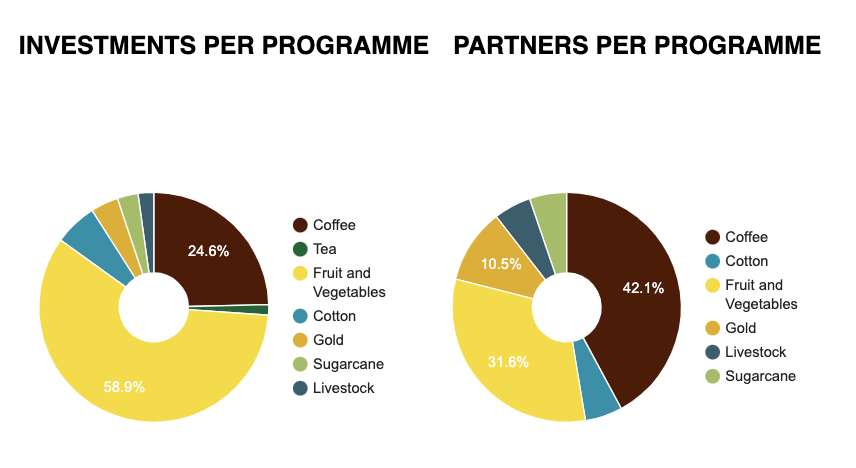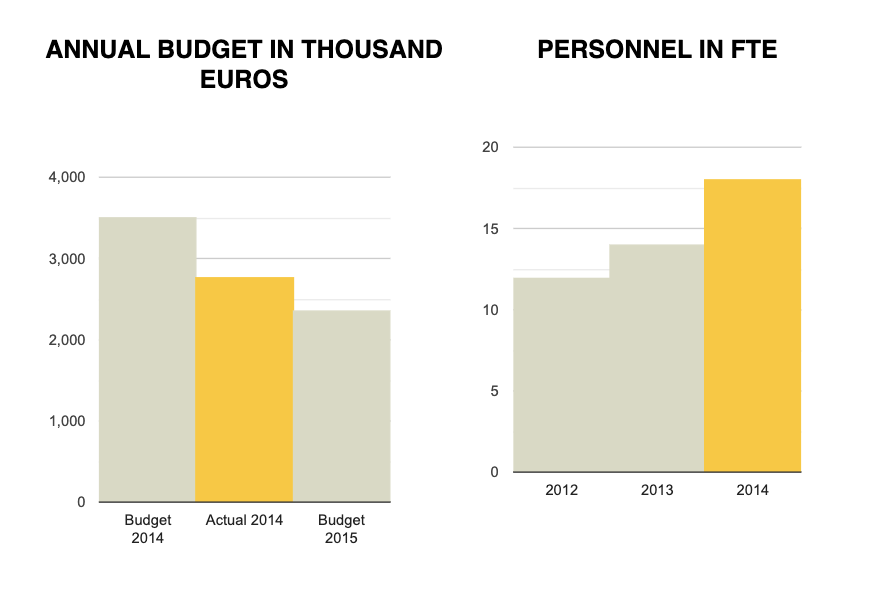REGIONAL COMMODITY PROGRAMMES
Our partnerships in the tea industry focused on addressing climate change, as well as issues related to youth and social inclusion. The annual tea drinking competition attracted plenty of interest and new entrants.

The horticulture project in Kenya has helped to improve standards of living through collaborative partnership with other stakeholders. Our innovative approach was to involve marketing agents to connect farmers to the local market. Access to EU buyers remained a challenge.

Solidaridad participated in the online campaign How to Change the World With Sugarcane”. We implemented our project in Tanzania using the sustainable management tool (SMT), with support from Solidaridad Southern Africa. The SADC sugar protocol was the preferred standard system for training farmers on sugar production in Tanzania.

Sustainable coffee production was the key target for the REC achieved by building the capacity of the key stakeholders. The food security project (FOSEK) has the potential to build resilience through sustained coffee and food crop production, helping to improve household livelihoods.

Solidaridad initiated a project on improving beef productivity with other stakeholders. We also participated in the UN’s Food Agriculture Organization (FAO) multi-stakeholder initiative “Global Agenda for Livestock Dialogue”, which aims to promote the sustainability agenda and create sustainable land use practices in the livestock sector.

The cotton programme embraced global strategic approaches in its implementation. Marketing significantly affected cotton production and expansion. Scoping studies, surveys, the development of road maps and national stakeholder forums, were all strategies deployed in the region.

The gold project in Kenya’s Migori and Kilgoris counties, which is funded by UK charity Comic Relief, has generated global interest. This required artisanal miners to be trained in health and safety. A regional conference was held in Geita, Tanzania, to share opportunities, experiences and lessons learnt in the first two years of the project’s implementation.

EXTERNAL DEVELOPMENTS
The East African Community (EAC) is a regional intergovernmental organization that is composed of five countries: Burundi, Kenya, Rwanda, Tanzania, and Uganda. Ethiopia and Somalia in the north have also applied to become members. This partnership has widened socio-economic and political cooperation in order to achieve mutual benefits, which include significantly improving regional cross-border trade. Technological improvements, especially in the transport sector, have also contributed to faster and cheaper delivery of goods, for example, from the Dar Es Salaam and Mombasa ports to inland destinations.
Negotiations for an East African Monetary Union, which started in 2011, and the fast-track process towards an East African Federation underscore the serious determination of East African leaders to build a powerful economic and political bloc. The African Union has been working towards COMESA-EAC-SADC Tripartite (an umbrella organization consisting of three of Africa’s Regional Economic Communities) to nurture strong working relationships.
In the fiscal year 2012-13 The Ethiopian economy grew by 9.7%, the tenth year in a row of robust growth. This momentum was maintained in 2013-14 and is expected to continue in 2014-15, albeit at a slower pace because of constraints on private-sector growth. Ethiopia’s Growth and Transformation Plan is geared to fostering sustainable, broad-based development as part of an attempt to achieve the Millennium Development Goals. The overall target is to double agricultural production to ensure food security.
Africa is at the threshold of a promising petroleum industry, with six of the 10 biggest oil and gas finds in the last decade having been found on the continent. It’s estimated that there are 2.3 billion barrels of recoverable oil in Uganda and Kenya and more than 50 trillion cubic feet of natural gas in Tanzania. There are also exciting prospects of finding oil and gas in Burundi and Rwanda. There is thus significant potential for improved economic growth in the future as a result of access to cheap energy.

RESULTS AND PARTNERSHIPS
The Horticulture and Food Security Program, which is funded by the Dutch Embassy in Kenya, continued to have a very positive impact on smallholder horticulture farmers. Three local banks became involved and they loaned farmers 8,000 euros in credit inputs through a contracted supplier, most of which they had refunded by the end of the year. This project has created more employment, particularly for young people and women.
The first phase of the project on Food Security in Ethiopia and Kenya (FOSEK) was completed. This private-public partnership project is funded by the Dutch Ministry of the Foreign Affairs and implemented in partnership with Nestlé, Ethiopia Coffee Unions, Coffee Research Institute, and various private companies in Kenya. During the year, a Joint Learning Platform was established and a similar funded project was implemented by a consortium led by Hivos.
At Solidaridad we recognize that strategic partnerships have the potential for greater impact and scale. In the private sector, we’ve built a strategic partnership with Heifer Project International (Kenya) in Dairy and with Sanergy for organic fertiliser. Other partners included private sector companies such as SoilCares Ltd and Meru Greens and the governments of Migori and Kirinyaga counties, targeting the banana and gold sectors, respectively.
We also aimed to expand our funding portfolio. Seventeen proposals were drafted (total value €14,128,568), six of which are being considered for funding in 2015. We have changed from writing “blind” proposals to early discussions with potential funders. This has led to significant success with Ford Foundation, BESTSELLER FUND, ABi Trust and Comic Relief.

DONORS AND ORGANIZATIONS
We continued to work with a range of donors in implementing the various projects. Key among these was the Dutch Embassy, which has been funding the Horticulture and Food security project for the last four years. The Dutch Ministry of Foreign Affairs has funded the food security project (FOSEK), while we have also continued to support some projects in southern Africa, for example, tea in Mozambique. Irish Aid and the Netherlands Directorate General for International Cooperation (DGIS) continued to fund coffee and farmer support programmes, respectively.
In the field of human resources, a programme manager was recruited for the Food Security Project (FOSEK), while a short-term consultant staff was appointed to oversee the cotton and textiles programme in Ethiopia. A former textile liaison manager at the Netherlands office relocated and was appointed by Solidaridad as the country programme manager for Ethiopia. Three agronomists were employed to reach horticulture farmers in Kenya. An internal control system officer was employed to oversee Fair-Mined Gold certification in Kenya.
Capacity enhancement programme for Solidaridad staff was carried out in August 2014, supported by the Network PME coordinator. The objective was to strengthen the team in project cycle management (PCM). we have made great strides in incorporating learning in project management and a key outcome was the establishment of the Joint Learning Platform for the Food Security Program. This allowed us to share experiences and challenges with a sister project that is being implemented by Hivos and its partners under the 4S@Scale project.
To increase capacity and learn from the experiences of other regional expertise centres, staff participated in various global team meetings: coffee and tea in the Netherlands, gold in Peru, livestock in Brazil, sugarcane in South Africa, and textiles in the USA. Furthermore, Donor Committee for Enterprise Development (DCED) global training was organized in Thailand and Planning, Monitoring & Evaluation (PME) in Ghana. The African continent financial and PROgraMme Information System (PROMIS) meeting was attended by our accountant in South Africa.
